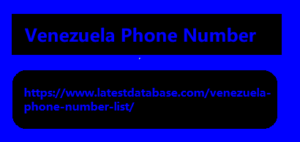How to create a negative keyword list with Semrush
Mar 5, 2024 2:57:23 GMT -3
Post by account_disabled on Mar 5, 2024 2:57:23 GMT -3
In a perfect world, we could all simply rely on exact match keywords. In reality, most of us also need to use broad match and phrase match keywords to drive more traffic to our website. The disadvantage? That we are constantly competing with too many competitor campaigns at the same time. Many campaigns we compete with involve websites that have nothing in common with ours. That's why the key to a highly targeted campaign is to choose what we don't care about. This is where negative, or negative, keywords make a difference. What are negative keywords? A negative keyword, also known as a negative keyword, is a query that will not trigger your ad. In other words, your ads won't show to users who search for that particular combination of words and phrases. Negative keywords are useful for increasing the relevance of your campaign.
For example, if you're running a campaign advertising mountain climbing Venezuela Phone Number gear for kids, you'll most likely choose to bid on search queries like climbing gear or climbing gear. These are very generic terms, which means that if someone searches for combinations like tree climbing equipment or adult climbing equipment, your ad will enter the auction and be shown to all users. However, the user looking for adult climbing equipment has no interest in children's products. Those looking for tree climbing tools are equally irrelevant to you, as you offer rock climbing equipment. Showing yourself to these users is a waste of your advertising budget because these are people who will most likely ignore the ad and decrease its CTR, or click on it but not buy anything because you don't offer what they are looking for. By adding "adult" and "tree" as negative keywords, you're telling Google Ads that your ad shouldn't show for these types of queries.

How do negative keywords work? Negative or negative keywords work differently than regular "positive" keywords. They need an exact match. Normally, Google automatically associates variations of a keyword with the same query, but this does not happen for negative keywords. Therefore, when you add a negative keyword to a campaign, you must include synonyms, singular or plural versions, as well as misspellings and other variations of the word. For example, in the case of "mountain" you would include mountains, monte, montano, etc. One final thing to consider is that negative keywords for Display and Video campaigns work differently than for Search. If you choose to use Display and Video campaigns, your ad may still appear for your excluded terms on unrelated sites and/or videos. To best support proper keyword exclusion for Display and Video campaigns, remember to also implement site category options and content exclusions. Types of negative keywords There are three match types to choose from: broad match, phrase match, or exact match negative keywords.
For example, if you're running a campaign advertising mountain climbing Venezuela Phone Number gear for kids, you'll most likely choose to bid on search queries like climbing gear or climbing gear. These are very generic terms, which means that if someone searches for combinations like tree climbing equipment or adult climbing equipment, your ad will enter the auction and be shown to all users. However, the user looking for adult climbing equipment has no interest in children's products. Those looking for tree climbing tools are equally irrelevant to you, as you offer rock climbing equipment. Showing yourself to these users is a waste of your advertising budget because these are people who will most likely ignore the ad and decrease its CTR, or click on it but not buy anything because you don't offer what they are looking for. By adding "adult" and "tree" as negative keywords, you're telling Google Ads that your ad shouldn't show for these types of queries.

How do negative keywords work? Negative or negative keywords work differently than regular "positive" keywords. They need an exact match. Normally, Google automatically associates variations of a keyword with the same query, but this does not happen for negative keywords. Therefore, when you add a negative keyword to a campaign, you must include synonyms, singular or plural versions, as well as misspellings and other variations of the word. For example, in the case of "mountain" you would include mountains, monte, montano, etc. One final thing to consider is that negative keywords for Display and Video campaigns work differently than for Search. If you choose to use Display and Video campaigns, your ad may still appear for your excluded terms on unrelated sites and/or videos. To best support proper keyword exclusion for Display and Video campaigns, remember to also implement site category options and content exclusions. Types of negative keywords There are three match types to choose from: broad match, phrase match, or exact match negative keywords.
